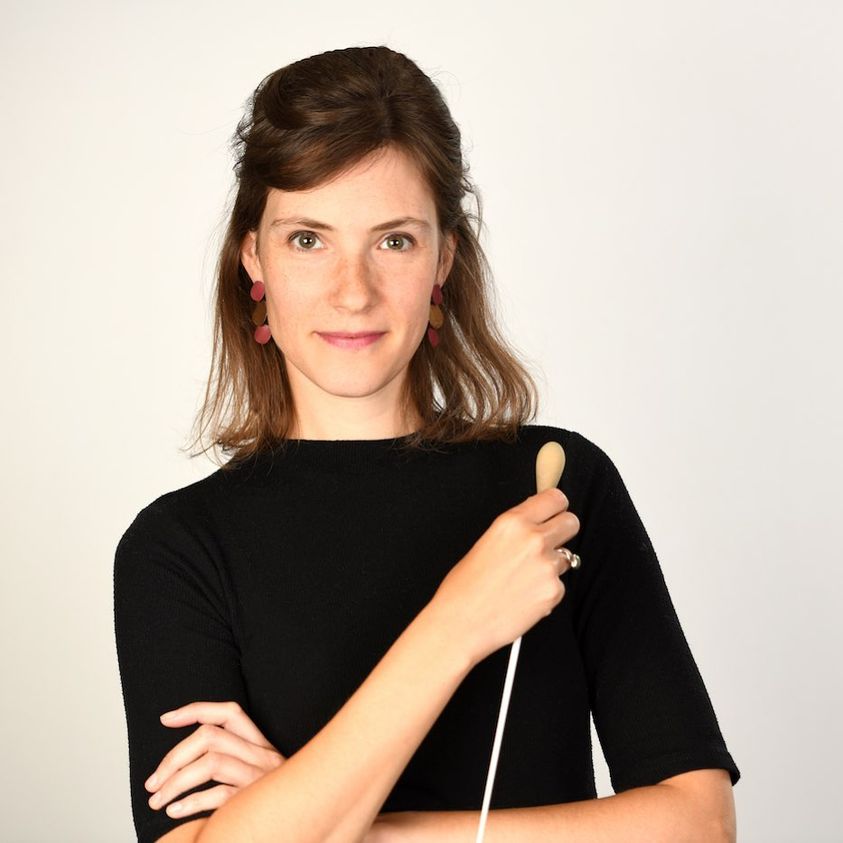Birmingham tries out a Mirga lookalike
mainChristopher Morley’s latest review of the City of Birmingham Symphony Orchestra in its extended centenary season:
CBSO Symphony Hall ****
The latest in the CBSO’s unlocked-down series of concerts was very much in the meat and two veg tradition, overture, concerto and symphony. The only innovation was the absence of the interval, something which must surely be on the table for discussion. Now that there are no longer overnight reviews, I am sure most critics would welcome an earlier end to concerts; against that we have to balance the venue’s loss of catering takings. Blissfully there is no room for encores, either.
Conducting was someone new to me, the young French conductor Chloe van Soeterstede, very much in the elfin mode in which Mirga Grazinyte-Tyla first presented herself to us, and with an equal outpouring of enthusiasm.
Yet her account of Mozart’s Don Giovanni Overture, though it zipped along, was lacking in dynamic shading, Chloe (may I? — like Mirga, she shares a weighty surname), relying instead upon Mozart’s balance of textures.
“Heaven and Hell” was the subtitle of this programme, but if the Mozart was a depiction of Hell and the concluding Mendelssohn Reformation” Symphony a glimpse of Heaven, could Beethoven’s Second Piano Concerto really be cast as Purgatory?
Of course not, and even more emphatically in this wonderful reading from Paul Lewis. Before this performance began, though, I was surprised the orchestra tuned to the oboe and not to the piano; no problems, however.
Chloe launched the orchestral introduction with a wonderful “lift” to the phrasing before Lewis’ bright, brisk opening combining in Beethoven the lyricism of Mozart and the quirkiness of Haydn. Flecks of fresh detail emerged, and the cadenza was simply a miracle of controlled drama.
Lewis and Chloe gave us an adagio which had the perfume of an operatic scena transmuted into instrumental colours, and the finale was full of verve and sparkle, playfully tossing around its rhythmic conundrums.
Nothing so playful about the Mendelssohn, Chloe and the orchestra catching well the solemn unfolding of the introduction as it eventually reaches the famous Dresden Amen, Wagner in Parsifal and Mendelssohn here both singing from the same hymn-sheet. This was a tight reading of the first movement, with broader implications, before a bravely Schubertian account of the scherzo’s awkward edges.
After a singing andante we moved, via Marie-Christine Zupancic’s seraphic flute into the lumpen “Ein’ feste Burg” finale, well-built towards a sturdy ending by these forces, but enlivened in terms of its composition only be the early sketches for Elijah hidden in its fugue.
There was enthusiastic applause from the audience, but a grump from one listener, who always thought the orchestra should not stand to acknowledge the conductor’s accolade until the concertmaster rises.
Christopher Morley

So it’s a noe, Chloe?






Herbert von Karajan or Herbie if I may swept his lustrous locks back and …
Sexist twaddle this review.
I think it was only Sir James Galway that got away with “Herbie”.
The original Mirga’s tenure is shorter than those of her three rising predecessors. Now she busy guest conducting absentee director, a year before the expiration of her contract, at a time when the orchestra is trying to get back on its feet after Covid. Am I missing something? How did it really work out with the Mirga?
Petros,
I believe Mirga had agreed concerts with Mozarteum Orchester before the CBSO knew when they would be allowed to restart their concerts.
Mirga is going to Birmingham soon and is conducting two pairs of concerts on 16th and 23rd June.
She won’t be remembered as Simon, Sakari or Andris are.
Not for similar reasons anyway.
Let’s move on !
What is it with this acceptance of referring to female conductors by first name and male by surname? How on earth are we going to normalise gender equality in this industry if we still patronise like this?
I noticed that too. It’s not as if van Soeterstede is that difficult to write. And calling her “elfin?”
The whole article is full of florid language and tropes more usually found in romantic novels.
What the hell does this mean – even for the experienced music lover; ” had the perfume of an operatic scena transmuted into instrumental colours, and the finale was full of verve and sparkle, playfully tossing around its rhythmic conundrums”?
. . . must have been written by a record critic.
It means our time is better spent listening to good music.
SD and others also call the MET conductor simply Yannick. And nobody refers to Marin Alsop as Marin.
I agree with the point you make here, but some conductors do get referred to informally – Yannick and The Dude come to mind and many simply refer to Andris and Sir Simon, for example.
Probably, it is because they are all readily identified without a surname – like Mirga.
https://www.business-live.co.uk/retail-consumer/haydn-london-cbso-review-andris-9202496
https://www.birminghammail.co.uk/whats-on/music-nightlife-news/review-prokofievs-romeo-juliet-cbso-6523286
Derek, you’re absolutely right in what you say about Yannick, Sir Simon and Andris. However it’s worth noting that Mr Morley did not refer to the latter by his first name in reviews (see two examples above, the first two that came up on a quick google search).
Chloe van Soeterstede is certainly not yet familiar enough to be referred to by her first name only.
I don’t have much to add to the many comments about the squeamishly sexist and patronising tone of this review and others by the same reviewer apart from to ask, is it really in the CBSO’s best interests to maintain such a close association with this journalist? Even taking all the above aside, it’s not like readers ever get any musical illumination from what he writes either, and the content regularly has a transparent “cheerleader” tone that does no favours to an orchestra that should be presenting itself as a top international arts organisation.
John,
As I said, I agree with the point made and I agree with your comments as well, particularly on the “sexist and patronising tone of this review”.
I was pointing out that sometimes people do use short hand in names, where it is easy to do so without confusion. However, It is best to avoid doing so in reviews.
https://www.midlandsmusicreviews.co.uk/2020/01/london-symphony-orchestrarattle-review.html
Nor does Mr Morley refer to Simon Rattle by his first name in his most recent review of a concert conducted by him.
J
It’s obviously going to be Chauhan. They should just announce it and be done with it.
“A Mirga lookalike”. Chloe van Soeterstede looks nothing like Mirga Grazinyte-Tyla. Unless for some some men all women under 60 look the same.
I second the comments about presuming to use her first name — Imagine: “Maxim (may I? — like Thomas he shares a weighty surname”) — leading to the laughable “Lewis and Chloe gave us an adagio …”
They are both plain Janes.
How one can give four stars if there was an absence of dynamic shading in as dramatic a piece as the overture to Don Giovanni amazes me. Perhaps 4/10?
Wow. Would you call two comparable men ‘lookalikes,’ or do you think that was influenced by these conductors’ gender? Sexism at play, clear as day. Do better. It’s not hard!
When I was young, I always confused record cover photos of Herbie and Lennie. I had to look twice to be sure. They had similar hair and even somewhat similar faces. (That’s where the similarity ended, however.)
In the 70s and 80s, James Levine and Izaak Perlman had very similar hair and superficial similarity in their faces, enough to joke about it on stage.
https://www.youtube.com/watch?v=wEmbFSiJzEQ
If you can’t be bothered to write Van Soeterstede, maybe just use CVS?
I agree with the comments about the sexism in this review. I would just like to add that the headline is inaccurate – she is not a “Mirga lookalike”. She did not flail her arms around, she did not jump up and down, she is not an exhibitionist. I had never seen/heard her before, but I enjoyed the concert, and not only because it was the first live event I had attended for over a year.
‘Chloe’, may you? No you may not, unless you then call ‘Paul’ by his first name too on all subsequent iterations.The music world has long been an international industry so this kind of sexist reductionism is yesterday’s journalism.
Physical likeness to Mirga is also unbelievably sexist. You can compare the style, physical gestures etc, – of course but the physique as ‘elfin’…? It’s so lazy, so unnecessary. I’m absolutely livid.
Gosh! Could the underlying sexism be any more blatant in this without actually tipping over into a review that by any standard of decency would have to be spiked?
The review is outrageous: ‘Lewis and Chloe’ .
There’s a bigger issue, though, isn’t there? Surnames (especially difficult ones) make classical music artists sound pompous and inaccessible to the general public – shouldn’t this industry (both men and women) have learned decades ago from John, Paul, George and Ringo?
This seems a very great deal of hand-wringing over one brief comment — the “elfin style” comparison to MG-T — and the use of the conductor’s first name. Much ado about very little.
FYI, and as has been pointed out above, Dudamel is actually referred to widely simply as “Gustavo,” Bernstein was often referred to as “Lennie,” and YN-Z is usually referred to as “Yannick.” Mr. Morley essentially gives his reason when he compares “Chloe” to “Mirga” in terms of what he calls “weighty” surnames — that’s one reason this happens. Another is the readiness of identification with a star figure — cf. “Angelina”, even though that actress works using her full name. Or “Aretha” or “Dolly” — no-one is in any doubt who is being referred to. “Denzel” is another, as were all the Beatles in their day, though latterly it is “Sir Paul.”
I think we are in the department of get over yourselves. For a blog in which posters are quick to jump on victimology, some seem very willing to take offence where clearly (to me) none was intended.
Maybe. But it seems as though the author of these CBSO reviews would like to be taken seriously from a journalistic, or at least a professional writing, perspective. As such, the author should write seriously.
Personally, I worry less about the use of first name or surname and more about “elfin” as a descriptor. That’s nonsense.
The author of the review is a respected journalist, former arts editor of the Birmingham Post.
In that case, it’s regrettable that he didn’t take this assignment seriously.
Less respected now
“Elfin” is just a metaphoric adjective, and rather a charming one. From the photo of the young conductor, it seems rather apposite. Is it no longer permissible to use language other than the barest bones? Reviews would turn into “They played the notes in order, and could be heard throughout the hall.”
The word is evocative rather than descriptive.
What does it evoke? Tolkien’s stately elves, or small wispish fairy-folk? I suspect Mr Morley referred to the latter.
Yes, some over-reaction on Ms van Soederstede’s account, I do agree. But we can be offensive without meaning to be, and it is something to guard against (especially in a professional review).
I think what got me was the twee “may I?” – in a context where the person asked has no opportunity to say either “of course” or “well, I would rather you didn’t”.
Mr Morley seems not to have been very impressed. Would the tone of his review have been the same for a young male conductor? Was he being a gentlmean and sparing the poor young lady?
gentleman (not gently mean)!
Thank goodness we won’t have a problem with Midori should she come to Birmingham
I would not want to struggle hard to succeed in a music conservatory only to be referred to as a “Mirga Look-Alike”.